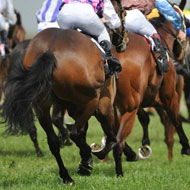Racing authority amends rules on influenza vaccine

All horses that enter the racecourse must have been vaccinated against equine influenza by a veterinary surgeon.
The British Horseracing Authority (BHA) is alerting horse owners, trainers and veterinary surgeons of two important changes to its rules of racing.
Rule (E) 18 has been amended so that horses will not be permitted to run in the event of a failure to comply with any of the requirements for vaccinations against equine influenza.
Under the BHA’s rules of racing, all horses that enter the racecourse must have been vaccinated against equine influenza by a veterinary surgeon, to control infectious disease and protect equine welfare.
Currently, in the event of non-compliance, the horse may not be permitted to run unless it has, in the opinion of the veterinary officer, received at least a vaccination against equine influenza. The BHA says this effectively permits horses to run when they have not been vaccinated correctly, which could present a risk to other horses at the site.
The rule is now worded:
'18.7 In the event of failure to comply with any of the requirements of this Rule in respect of a horse which is on Racecourse Property
'18.7.1., unless the Stewards have given their permission the horse will not be permitted to run in any race; and
'18.7.2 the Trainer or the Owner of the horse are liable to Disciplinary Action'.
In addition, the BHA has introduced a new rule that will require horses to be stood down from racing for five days after extra-corporeal shockwave therapy.
ESWT is used in equine orthopaedics to treat a number of conditions, and involves directing shock waves onto the injured area.
The new rule is worded: '11.C The horse must not have been administered extracorporeal shockwave therapy (ESWT) on the day of the race or on any of the five days before the day of the race in which the horse is declared to run.'



 RCVS Knowledge has welcomed Professor Peter Cockcroft as editor-in-chief for Veterinary Evidence.
RCVS Knowledge has welcomed Professor Peter Cockcroft as editor-in-chief for Veterinary Evidence.